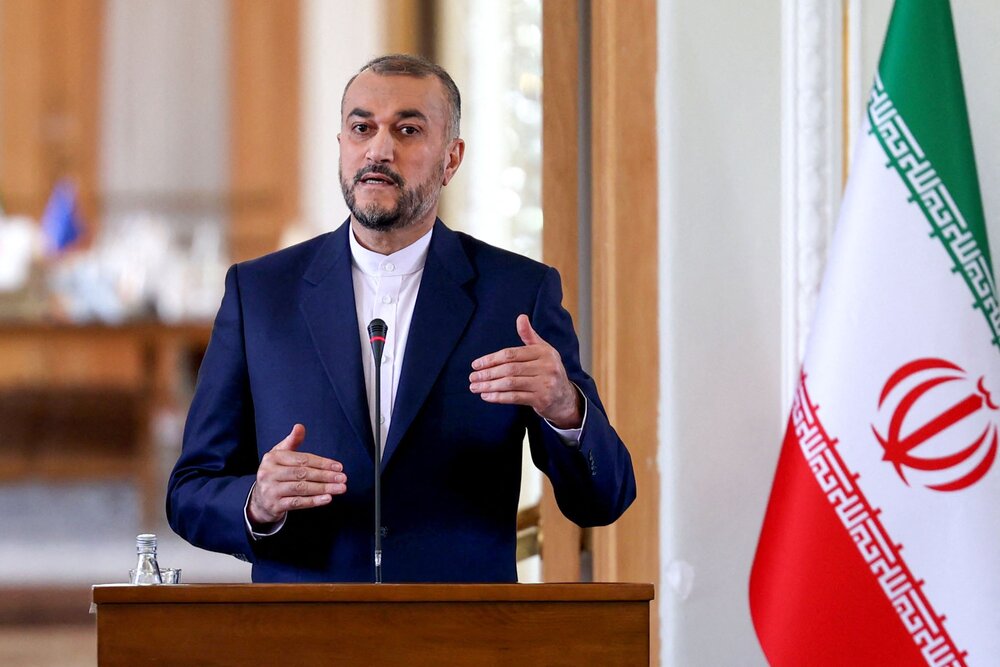Iran FM insists diplomacy is best way to address Tehran-Baku issues

TEHRAN- Iranian Foreign Minister Hossein Amir Abdollahian has slammed Azeri President Ilham Aliyev's "unrealistic statements," saying dialogue is the only way to resolve the issues between Tehran and Baku.
Amir Abdollahian hinted at those sentiments during a phone call with his Azeri counterpart Jeyhun Bayramov late on Tuesday, but also conveyed Iran's displeasure with certain “unrealistic comments” by Azeri President Ilham Aliyev.
It is a fundamental concept to respect nations' territorial integrity and sovereignty and refrain from meddling in their internal affairs, the Iranian chief diplomat noted.
In remarks in Samarkand, Uzbekistan, on November 11, Aliyev hailed Azerbaijani Turks, the most of whom live in northwest Iran, as "compatriots", expressing sadness that they were "separated from the state of Azerbaijan due to tragic fate."
Addressing the summit of the Organization of Turkic States, a pan-Turkic organization that promotes Turkish unity and integration, he declared, "The state of Azerbaijan pays special attention to the protection of the rights, freedoms, and security of Azerbaijanis residing abroad."
He added, “We will continue our efforts so that our compatriots, who were separated from the state of Azerbaijan due to bitter fate, preserve our language, traditions, and culture, remain loyal to the ideas of Azerbaijanism, and never cut ties with their historical homeland.”
Amir Abdollahian said such remarks “create a fertile ground for the adversaries' exploitation."
The Iranian foreign ministry summoned the ambassador of Azerbaijan in response to Aliyev's statements.
“During the session, the Iranian foreign minister’s assistant and director general of the Foreign Ministry’s Eurasia Department conveyed Iran’s strong protest at and dissatisfaction with the unfriendly remarks of Azerbaijan’s top officials and Azeri media’s smear campaign to Baku’s envoy,” the ministry said in a statement.
Nasser Kanaani, the spokesperson for the Iranian Foreign Ministry, stated on Monday that Iran does not overreact to every careless remark as Tehran maintains a policy of good neighborliness toward neighbors.
Talking to reporters in a regular press briefing, Kanaani added, "No one should see Iran's forbearance as weakness. It is preferable to understand the history accurately since the histories of the nations in the region are transparent and cannot be twisted."
Iran, Pakistan FMs discuss Afghanistan
Foreign Minister Amir Abdollahian also held phone talks late on Tuesday with his Pakistani counterpart Bilawal Bhutto Zardari on the most recent issues pertaining to bilateral and international ties.
Amir Abdollahian urged Tehran and Islamabad to work together more closely on Afghanistan-related issues, with a focus on addressing the issue of Afghan refugees.
In addition, he informed Zardari that Tehran valued Islamabad's stance against the most recent terrorist attack on the revered Shah Cheragh shrine in south-central Iran.
Amir Abdollahian also expressed sorrow and sympathy for the flood victims in Pakistan, highlighting the readiness of the Islamic Republic of Iran to assist the Pakistani government and people in easing their pain.
For his part, the foreign minister of Pakistan emphasized the significance and necessity of fostering bilateral, regional, and global cooperation while making reference to the longstanding and cordial relations between Iran and Pakistan in a variety of domains.
Zardari stated earlier in July that his nation places value on tight coordination with Iran on issues pertaining to Afghanistan, like refugee management, regional security, and institutional frameworks.
In order to advance long-term peace and security in the region, the senior Pakistani diplomat further emphasized the necessity of ongoing positive engagement and practical collaboration with the interim Afghan government.
Under the guise of the so-called war on terror the United States invaded Afghanistan in late 2001 and overthrew the Taliban regime. The invasion and the accompanying fighting significantly exacerbated the nation's security condition.
On August 15, 2021, the Afghan government collapsed when President Ashraf Ghani left the country in the face of the Taliban's lightning-quick advances during the tumultuous U.S. pullout. The Taliban declared the establishment of an interim government in Afghanistan on September 7.
Leave a Comment